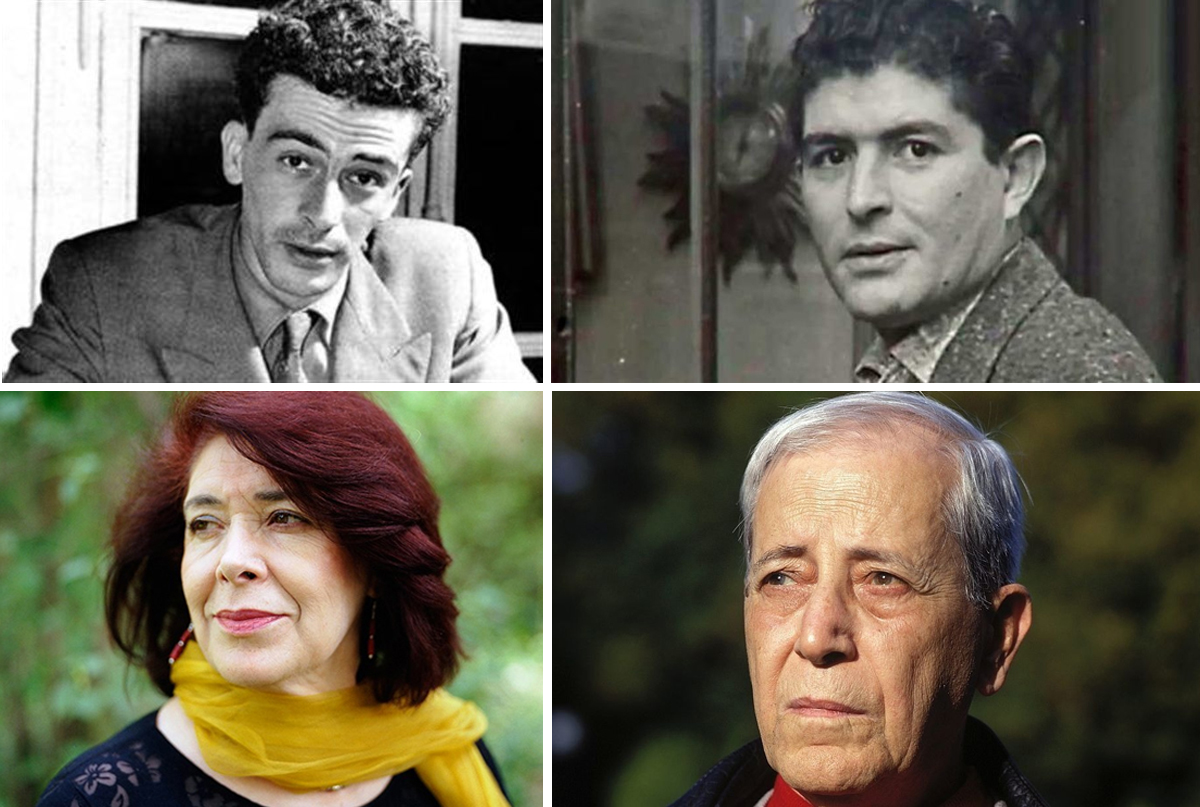From left to right, clockwise: Algerian writers Kateb Yacine, Malek Haddad, Mohammed Dib, and Assia Djebar.
Language is not just a means of expression; it shapes identity and offers a broader, more complex connection to culture. In his essay “Arabic Literature in French: A Confusing Classification,”* published in Al Quds Al Arabi, Algerian novelist Waciny Laredj unravels the complex relationship between Arab writers, the French language, and identity. Language, he writes, is not merely a tool of expression — for many, it is a “home” and a determinant of cultural and intellectual vision, especially among writers who adopted French, whether by necessity or strategic choice, whose Arab identities were erased and sidelined in the literary world.
Laredj poses pertinent questions: Is what is written in another language, French in particular, considered Arab, even if written by Arab writers? Another: Do Arab writers care about their Arab references in light of the Arab cultural and civilizational failure of the past hundred years? Does considering their literature as Arab constitute an identity concern for them? Such questions become the backdrop to this attempt to clarify the significance of the French language to Arab writers. Of course, there is no singular, universal answer to his queries. As he observes, the relationship between language and identity varies between generations.
The most glaring difference lies in each group’s attitudes toward their chosen writing language, French. Third-generation writers tend to be more sensitive about how their works are categorized and whether they are categorized appropriately. They are against their literature being placed in the “oriental” or “Maghreb writings” sections. Laredj points out that in bookstores, works authored by writers of Arab origin are often classified under less popular categories (for example, “literature written in the French language”), which harms their prospects and makes most of their books overlooked. The genre is often relegated to a corner seldom visited by the reading public. This categorization method intentionally avoids any reference to “Arabic,” which, in Laredj’s words, has become a “frightening word,” connotative of terrorism, as perpetuated by Western social media. Meanwhile, literature written in French but authored by Italian, Russian, German, Austrian, or Greek writers does not receive this treatment.
Alternatively, some writers are unconcerned with “easy and superficial classifications,” writes Laredj. They pay no attention to any bearing the concept of language may have on their works outside of being able to express themselves using the French language, believing “attention will be paid to him and his literature, regardless of the concept of language.”
Laredj also describes a shift from individual expression to nationalism through first-generation writers, who made great efforts to ensure their works were categorized as French literature. These writers, he states, “imbued with patriotism amidst oppressive wars of liberation, fought a fierce battle after national independence to be recognized as part of the national literature.” They firmly believe that ‘what is written in one language belongs to that language.’ Laredj specifically shines a light on Algerian writers who fostered the genre of “Algerian literature without French expression.” This generation of writers used French to combat ignorance and illiteracy in light of the ban on teaching Arabic. It continued to use the language to make Algeria’s voice heard internationally.
However, this type of literature and its writers suffered from exclusion and sidelining within the industry and the critics. Arab writers in French navigate a space of double exclusion — from both Arab and French canons. As Laredj writes, “There is a hidden tragedy that is not apparent, but present deep within the souls of these writers, who were subjected to a process of linguistic erasure, without this implying brainwashing, because they remained attached to their civilizational and cultural values.”
A few authors come to mind, including those who founded the Algerian Writers’ Union, who suddenly “became unwanted,” states Laredj. Several known Algerian writers, such as Mohammed Dib and Rabah Belamri, ended up in the French diaspora and were buried outside their homelands. Algerian novelist and filmmaker Assia Djebar lived in France and was honored with the Chair of Immortals at the Académie Française. Upon her death, she was returned to her hometown to be buried there, according to her will.
These writers wrote in a foreign language by choice; the French language became their “expressive bet not only on a fleeting historical moment or one conditioned by circumstances, whether colonial, occupational, or otherwise, but also on their strategic choice: to accept these losses or remain silent.” For writers like Malek Haddad, who rejected the implicit imagination that a foreign language cannot be tolerated, the French language is an exile and the “symbolic suicide” of silence is not the answer. In the words of Laredj, “Nationalism is not measured by discourse but by literary action.”
*Waciny Laredj’s essay, “Arabic Literature in French: A Confusing Classification,” was published in Arabic in Al Quds Al Arabi.
This article appeared in Inside Al Jadid Reports, No. 119, 2025.
Copyright © 2025 AL JADID MAGAZINE

